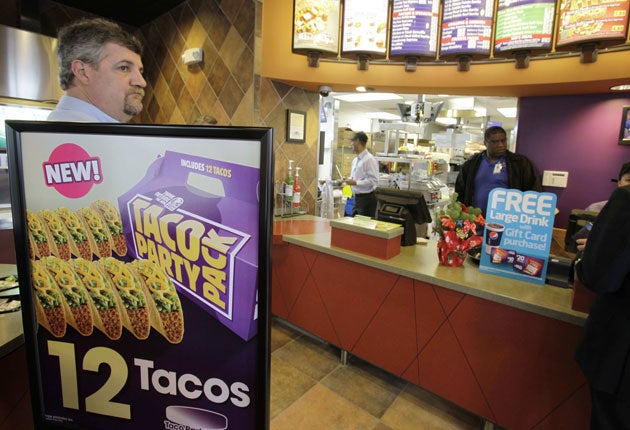Its ubiquitous billboards urge Americans to "think outside the bun" next time they fancy an artery-clogging treat. But the eyes of a nation are for the time being focused very firmly on what, exactly, ends up inside Taco Bell's popular range of meat-based snacks.
The Mexican-themed fast food chain, which has 5,500 outlets in the US, and another 500 dotted around the globe, spent the weekend on a crisis footing. The reason: a widely reported lawsuit alleging that less than half of the "seasoned beef" which fills its competitively-priced tacos and burritos has ever seen contact with a cow.
In what swiftly became known as the "where's the beef?" case, a California woman kicked off the controversy last week when she sued the company for "false advertising". Her suit alleged that the taco filling contains too many agents, preservatives, and flavour enhancers to be legally described as "beef" under US Department of Agriculture guidelines, which require such products to be at least 70 per cent meat.
Taco Bell vigorously disputed her claim, but that wasn't enough to prevent it from going viral. For several days running, one of the woman's attorneys, Dee Miles, was plastered across evening news bulletins and appeared on late-night chatshows alleging that his law firm had tested Taco Bell's filling and discovered that only 35 per cent of it was actually meat.
The rest, Mr Miles claimed, consists of "soybeans and wheat and oats", along with a wide selection of artificial flavourings and preservatives. "There are things in there that I can't even pronounce and don't know what they are. But they are non-beef products or non-meat products," he added. "So to call it beef is a misrepresentation."
Fast-food consumers aren't exactly obsessed with healthy eating or ethical food-sourcing, but Taco Bell knows a potential PR disaster when it sees one. So at the weekend the restaurant chain duly returned fire.
In a series of full-page adverts in every major US newspaper, together with a YouTube video starring its rotund president, Greg Creed, the company insisted instead that at least 88 per cent of its beef fillings are actually beef. The remaining 12 per cent, it said, consists of a "secret recipe" of water, spices and other products which contribute to the "quality of our product".
Under the headline, "thank you for suing us; here's the truth about our seasoned beef", the advertisements detailed all of the previously secret ingredients Taco Bell adds to the meat it sells to roughly 35 million customers each week. The firm denied using "extenders" to increase the volume of its taco filling.
Mr Creed meanwhile branded the class-action lawsuit, filed by an Alabama firm called Beasley, Allen, Crow, Methvin, Portis & Miles, as "bogus and filled with completely inaccurate facts". He promised to counter-sue the company and its clients.
Though the food chain is within its rights to protect its reputation, its aggressive tactics have surprised observers. "It is unusual for a company to take this on and challenge the allegations so boldly," said Gene Grabowski, who specialises in crisis litigation at Levick Strategic Communications in Washington. "A lot of companies are going to be watching how this turns out."
Whether the controversy is affecting the eating habits of customers is another matter. At a branch of Taco Bell in the firm's hometown of Louisville, Kentucky, regular Greg Long was asked whether he was concerned about what went into the firm's beef mix. "I've eaten it for years," said Mr Long, grabbing a Beefy 5 Layer Burrito. He added: "I don't care."

Join our commenting forum
Join thought-provoking conversations, follow other Independent readers and see their replies
Comments